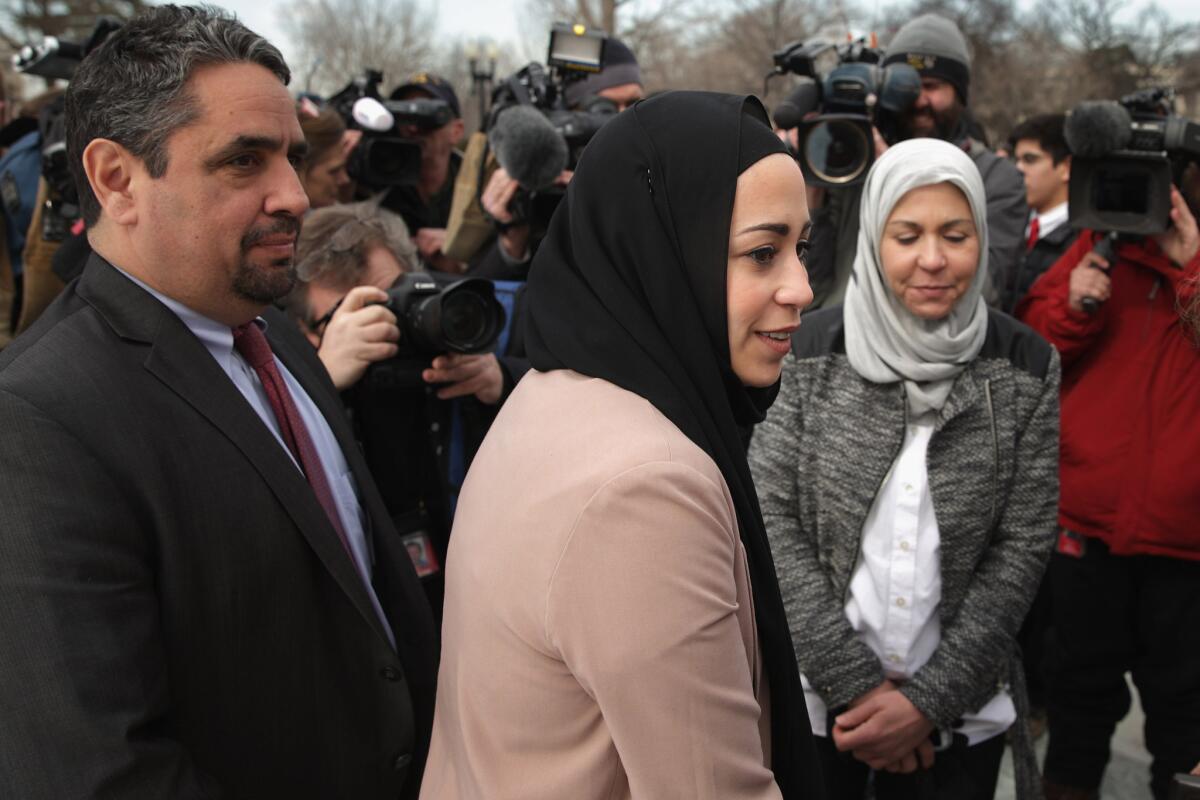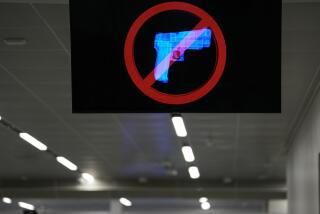Editorial: The high court and the hijab

Samantha Elauf, her mother Majda Elauf (right) and Equal Employment Opportunity Commission General Counsel David Lopes (left) are seen outside the
- Share via
The Supreme Court this week strengthened an important civil rights statute when it ruled in favor of a Muslim teenager who was rejected for a job because she wore a head scarf. But beyond its practical effect, the 8-1 decision offers a resounding reminder that generous accommodation of religious convictions — especially those of adherents of a minority faith — is a noble American tradition.
The decision was a victory for Samantha Elauf, who was 17 when she applied for a position at an Abercrombie & Fitch outlet in Tulsa, Okla. She was rejected after appearing at an interview wearing a modified black hijab that she regards as a “symbol of modesty in my Muslim faith.” The head covering was viewed as incompatible with the retailer’s “classic East Coast collegiate” look.
Title VII of the Civil Rights Act prohibits an employer from refusing to hire applicants because of religious practices that the company could accommodate without undue hardship. The issue before the Supreme Court was whether Abercrombie & Fitch could be held liable even though it didn’t know for certain that Elauf’s head covering was a religious observance. (The manager who interviewed Elauf assumed she wore a scarf because she was a Muslim, but she apparently never asked.)
Writing for the court, Justice Antonin Scalia rejected the company’s contention that it should be faulted only if it had “actual knowledge” that Elauf required an accommodation. The law also can be violated, Scalia said, if an employer refuses to hire someone because of an “unsubstantiated suspicion that accommodation would be needed.”
This decision was based on the Civil Rights Act, which, Scalia said, gives religious practices “favored treatment.” Such special protection for religion isn’t unique to that statute. Earlier this year, the court relied on a different federal law to hold that a state prison had to allow a Muslim inmate to grow a half-inch beard for religious reasons — even though the prison banned beards for supposed security reasons.
The most significant example of a law accommodating religion is the 1993 Religious Freedom Restoration Act, which allows a person to opt out of a generally applicable law under some circumstances if obeying it would “substantially burden” the exercise of religion.
Sadly, public support for that law and the larger principle of accommodation has been undermined in recent years by unwise expansions of the concept to cover profit-making corporations and to infringe on the rights of individuals. Examples of such overreaching are the Supreme Court’s Hobby Lobby decision exempting some businesses from including contraceptive coverage in employee health insurance plans, and attempts at the state level to enact “religious freedom” laws that would allow businesses to discriminate against gays and lesbians.
The court’s ruling against Abercrombie & Fitch is a timely reminder that in most cases, accommodating religious practice serves the interests of both devout individuals and a pluralistic society.
Follow the Opinion section on Twitter @latimesopinion and Facebook
More to Read
A cure for the common opinion
Get thought-provoking perspectives with our weekly newsletter.
You may occasionally receive promotional content from the Los Angeles Times.










